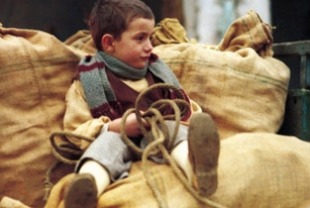In this lyrical and tender Italian film written and directed by Ermanno Olmi, we enter a rural tenement in the Bergamo region in the late nineteenth century. The families living there are the equivalent of sharecroppers who must give two-thirds of their produce to the landlord. A peasant and his wife are told by the Catholic priest that they should send their son to school even though this means that he will not be able to help in the fields. Once he starts attending classes, the boy shares what he is learning with his parents.
A woman who lives nearly is a widow with six children to support. She washes clothes in the river. After her oldest son lands a job, the priests suggests that she hand over her two youngest to an orphanage. But she and her son decide to make a go of supporting them all at home. A crisis ensues when the cow takes sick, and the veterinarian says that the animal is dying. The woman throws herself on the mercy of God and is surprised by the results.
Other vignettes flesh out life in this self-enclosed community where grain is gathered, a hog is killed, the village idiot visits various homes and is given food, and a grandfather secretly grows tomatoes in his own special way and is the first to take them to market. Olmi allows us entry into the lives of these devoted Catholics whose days are punctuated by prayers and songs while working. They gather in the evenings for stories and seem insulated from the world around them.
After a young couple gets married, they take a day-long riverboat trip to Milan for their honeymoon. On the streets of the city, police on horseback are hauling protesters off to prison, and there is noise in the far distance. They go to a monastery where an aunt is a nun. Aftering spending the evening there, they rise in the morning to discover that a one-year-old child is available for adoption. The child is accompanied by a stipend that will be sent to them regularly for his support.
The final sequence involves the father of the boy attending school. When one of his clogs wears out, his dad chops down a tree to make a replacement. The landlord finds out, and there are severe consequences for the family. Yet, unlike in the city, there is no protest or rebellion against this egregious injustice. The family suffers and the regular rhythms of life go on without a ripple. Olmi 's elegant and seemingly effortless drama is a masterpiece. It was winner of the Grand Prize at the Cannes Film Festival in 1978.
The DVD has the theatrical trailer and photo gallery of images from the film.
